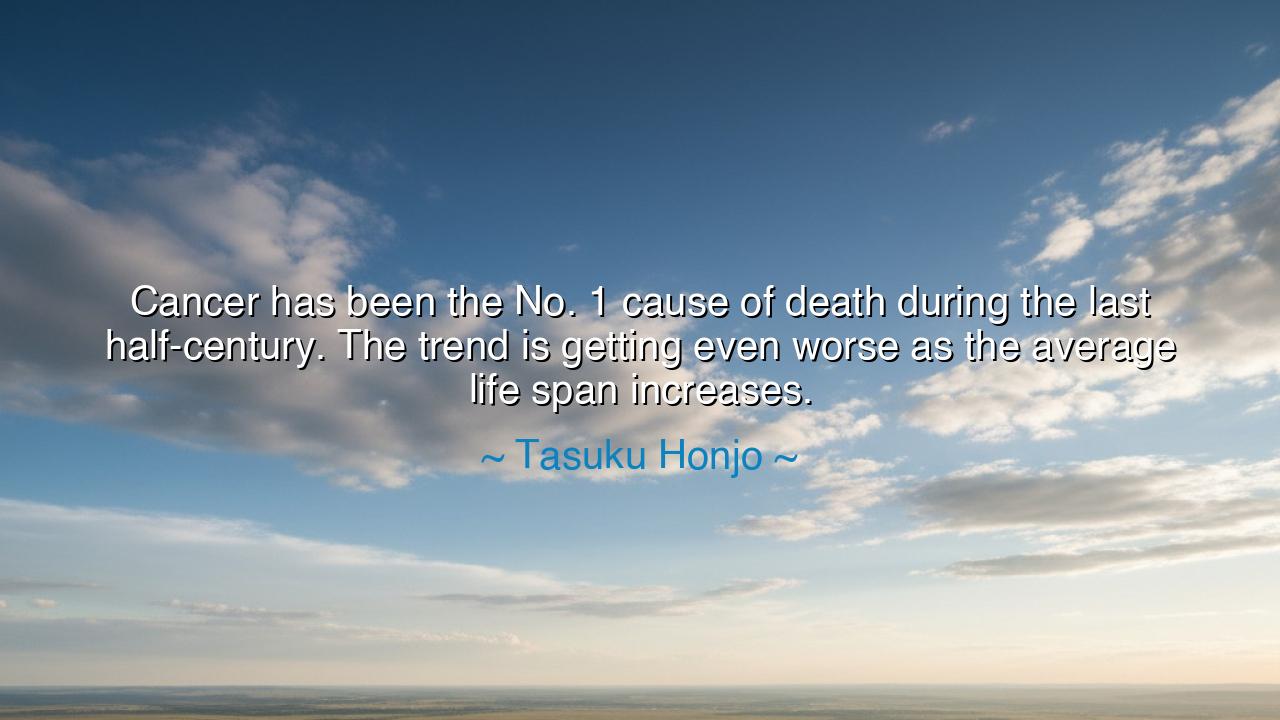
Cancer has been the No. 1 cause of death during the last
Cancer has been the No. 1 cause of death during the last half-century. The trend is getting even worse as the average life span increases.






The words of Tasuku Honjo, when he declared, “Cancer has been the No. 1 cause of death during the last half-century. The trend is getting even worse as the average life span increases,” are spoken not as lamentation, but as a solemn warning — a reminder that progress and peril often walk hand in hand. Honjo, a Nobel laureate whose discoveries in immunology opened new frontiers in the treatment of cancer, speaks here not only as a scientist but as a philosopher of the modern age. In his voice we hear the sorrow of one who has seen humanity extend its life, yet also multiply its vulnerabilities. He calls upon us to understand that longer life is not enough; it must also be a healthier and more meaningful one.
The origin of these words lies in the great paradox of modern medicine. For centuries, humankind fought against infectious diseases — plagues, fevers, and pandemics that once claimed millions. Through science and compassion, those foes were subdued. Vaccines conquered smallpox; antibiotics tamed infection; clean water and nutrition lengthened our days. But as the average life span increased, new enemies arose from within. The diseases of longevity — cancer, heart failure, dementia — took the place of the epidemics of youth. Thus, as Honjo observed, the victory over early death revealed a new battlefield: the war against the body’s own rebellion.
Cancer, the “emperor of all maladies,” is not a stranger to the human race. The ancients wrote of it in papyrus scrolls and carved it into their medical histories. Yet only in our age, when life is prolonged and cells have more time to falter, has it become the chief reaper of humankind. It is a cruel irony: the very success of medicine has given the disease more ground to claim. Honjo’s warning reminds us that knowledge alone cannot outpace nature — that every advance demands new humility, for the struggle between life and death is eternal, merely shifting its forms.
In the story of Honjo’s own discovery lies a glimmer of hope. It was he who uncovered the mechanism of PD-1, a protein that allows cancer to hide from the body’s immune defenses. Through this insight, new treatments — immunotherapies — emerged, enabling the body itself to recognize and destroy malignant cells. For countless patients once deemed beyond saving, these therapies brought new dawns. Yet even this triumph, Honjo warns, does not end the struggle. For as the light of science grows, the shadow of disease evolves beside it. The battle is not merely of the body, but of the spirit of perseverance, of never yielding to despair even as the odds grow vast.
The ancients spoke of Aesculapius, the healer who dared to challenge death itself and was struck down by Zeus for his defiance. Humanity has always carried that same defiant fire — the desire to heal what the gods once declared unhealable. Honjo stands among those who carry that sacred torch, not as one who denies death, but as one who seeks to delay its unjust hand. Yet his warning remains: as we live longer, we must not forget to live wiser. The purpose of medicine is not mere survival, but the preservation of vitality, dignity, and harmony between body and soul.
The lesson within his words, then, is twofold. First, we must not mistake longevity for fulfillment. The goal is not simply to add years to life, but life to years — to live with strength, awareness, and compassion. Second, we must recognize that the war against disease is not fought by doctors alone. Each of us must become the guardian of our own health — through discipline, mindfulness, and reverence for the body’s fragile gift. The path of prevention, of balance in living and purity in habit, is as noble as the path of discovery.
So let these words be carried to future generations: the triumph of science is not a shield against mortality, but a covenant with responsibility. As the flame of life burns longer, it must also burn cleaner, steadier, and more consciously. Cancer may be the great enemy of our age, but ignorance, neglect, and excess are its allies. If we heed Honjo’s wisdom, if we live not only longer but better — with gratitude, restraint, and courage — then the lengthened span of human life will become not a curse, but a blessing, worthy of the gods themselves.






AAdministratorAdministrator
Welcome, honored guests. Please leave a comment, we will respond soon